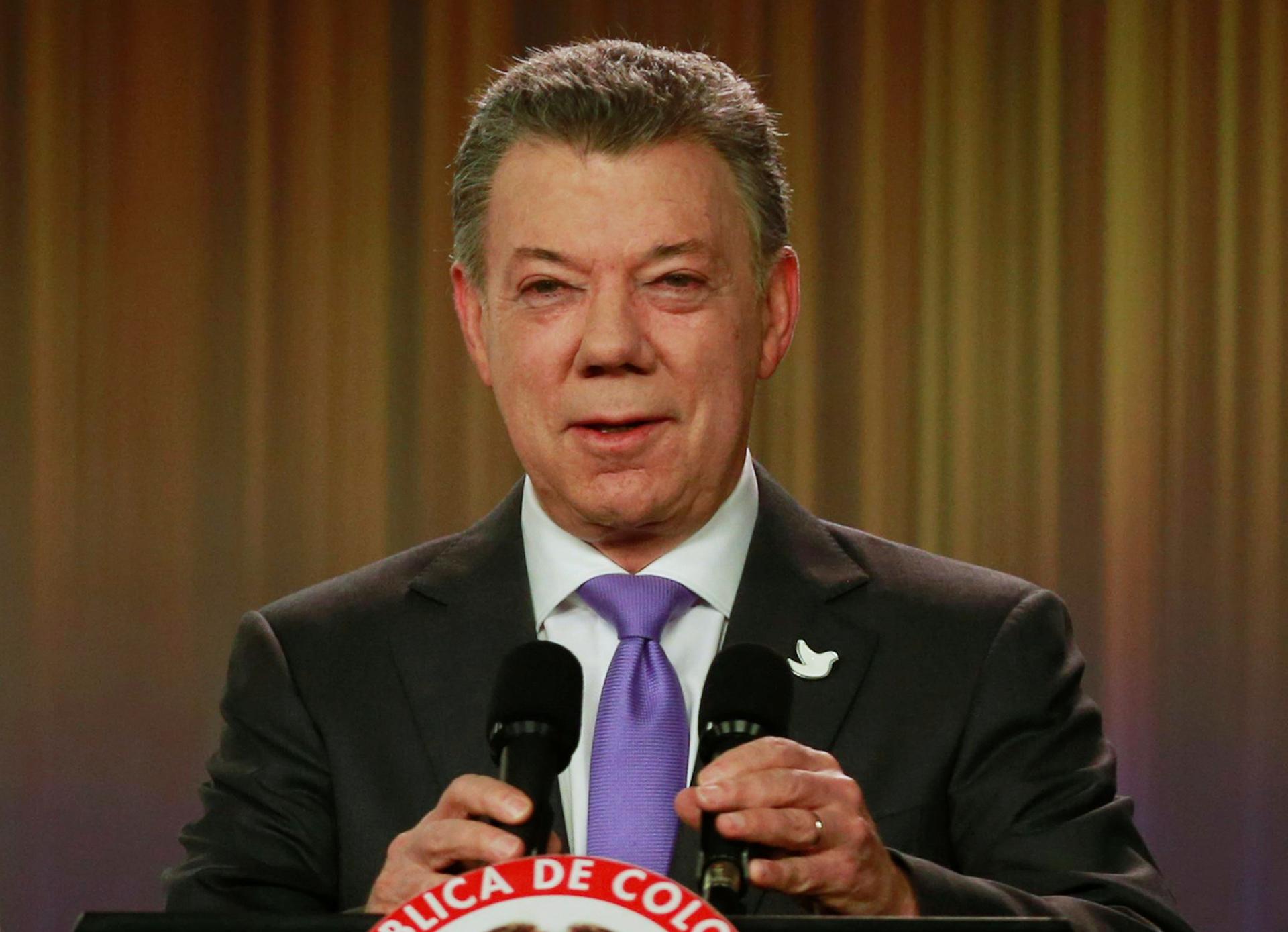Colombian president wins the Nobel Prize for his efforts to end war in his country
Colombia's President Juan Manuel Santos addresses the media after winning the Nobel Peace Prize at Narino Palace in Bogota, Colombia, on October 7, 2016.
Colombian President Juan Manuel Santos won the Nobel Prize Friday for his "resolute" efforts to end five decades of war in his country, despite voters' shock rejection of an historic peace deal.
The award was unexpected after voters rejected the accord Santos signed last month with FARC leader Rodrigo Londono, with some observers expressing surprise the rebel chief did not jointly receive the prize.
But the FARC chief congratulated his former enemy and said the only prize the Marxist guerrillas wanted was "peace with social justice for Colombia … peace in the streets."
The Norwegian Nobel committee said the award recognized Santos' "resolute efforts" to bring Latin America's longest war to an end and hailed his decision to put the peace deal to the people despite knowing it was controversial.
Committee chairwoman Kaci Kullmann Five paid tribute to other players in the peace process, without mentioning the FARC leader by name.
"By awarding this year's Peace Prize to President Juan Manuel Santos, the Norwegian Nobel Committee wishes to encourage all those who are striving to achieve peace, reconciliation and justice in Colombia," she said.
The deal, signed on September 26 after nearly four years of talks, was supposed to be ratified following an October 2 referendum, but voters shot it down, leaving Colombia teetering between war and peace.
The result caught Nobel watchers off guard, with most experts predicting the referendum would sink Colombia's chances.
But the committee said the aim was to encourage peace efforts, which are now in "real danger" of collapse.
"We hope that it will encourage all good initiatives and all the parties who could make a difference in the peace process and give Colombia — finally — a peace after decades of war," Kullmann Five said.
Santos said he was honored by the award, which he dedicated to "all Colombians, especially the millions of victims of this conflict that we have suffered for more than 50 years."
In remarks to the Nobel Foundation, he also said an end to the conflict was "very, very close" and that the award was "a great stimulus" in the quest for peace.
"The message is that we have to persevere and reach the end of this war. We are very, very close, we just need to push a bit further."
Countless victims
More than 260,000 people have been killed and 45,000 gone missing in the Colombian conflict which has involved leftist guerrilla groups, rightwing paramilitaries and drug gangs.
Under the terms of the deal, FARC was to relaunch as a political party, but the agreement was struck down following a successful campaign by rightwing hardliners angered by the offer of impunity for the rebels.
Santos, who has staked his legacy on making peace, has warned that Colombia is now in a "very dangerous limbo" while the Nobel committee said there was a "real danger that the peace process will come to a halt and that civil war will flare up again".
FARC leaders have vowed they are committed to peace, but it is unclear whether they will be able to sell a new deal to the rank and file.
'Too far to turn back'
UN chief Ban Ki-moon said the Nobel prize came at "a critical moment" and proved Colombia had come "too far [along the path to peace] to turn back".
Colombia's former leader Alvaro Uribe, who led opposition to the accord, also congratulated Santos, saying he hoped the award encourages "changes" to the deal.
Nobel watchers had initially tipped both Santos and Jimenez as likely winners, and Ingrid Betancourt, who was held by FARC guerrillas for six years in the jungle, said the rebel leader should have shared the prize.
Speaking to France's iTele channel, she said she was "very, very happy" the award went to Santos, and it showed "there was no turning back from peace".
Asked if she thought FARC should also have been honored, she answered: "Yes … it's very hard for me to say yes … but I think so."
Honoring former enemies
But some experts said it was not surprising the committee had chosen to recognize only Santos.
"A prize to FARC would have probably been poorly received by those who are sceptical about the peace agreement, and this therefore reduces the risk of the prize having a negative impact," said Kristian Berg Harpviken, director of Oslo's Peace Research Institute.
Asked why the prize had not been jointly awarded to the FARC leader, Kullman Five said, "We will never comment on other candidates and other possibilities."
The Nobel committee has in the past honored former enemies for peace processes at fragile stages, including those in Northern Ireland and the Middle East.
The peace prize is the fourth Nobel to be announced this week and comes after the awards for medicine, physics and chemistry.
The economics prize will be announced Monday, and the 2016 Nobel season will end on Thursday with the literature prize.
The peace prize is a gold medal, a diploma and about $932,000, which will be presented at a ceremony in Oslo on December 10.
Every day, reporters and producers at The World are hard at work bringing you human-centered news from across the globe. But we can’t do it without you. We need your support to ensure we can continue this work for another year.
Make a gift today, and you’ll help us unlock a matching gift of $67,000!
